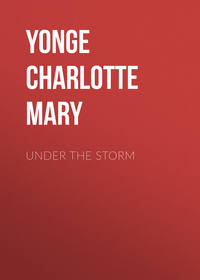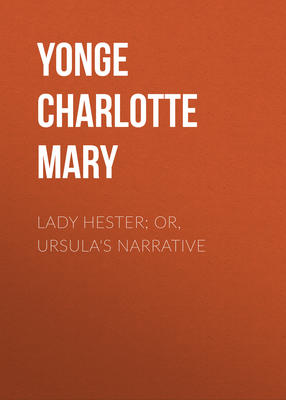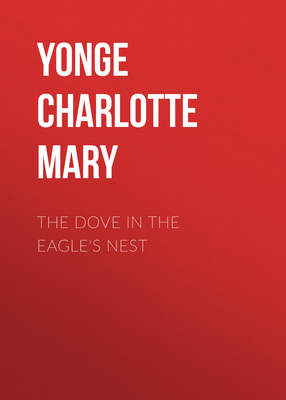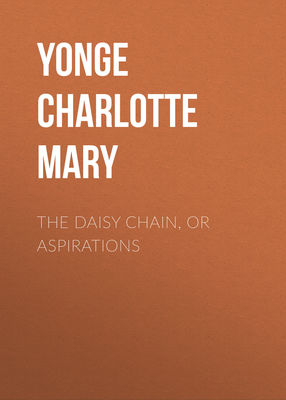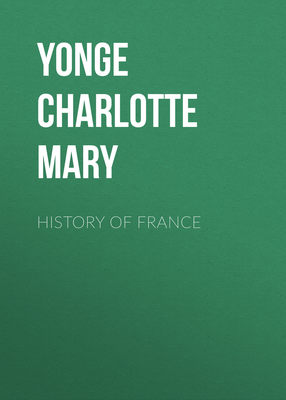Читать книгу: «Under the Storm», страница 11
CHAPTER XVIII. JEPH'S GOOD FORTUNE
"Still sun and rain made emerald green the loveliest fields on earth,
And gave the type of deathless hope, the little shamrock, birth."
IRISH BALLAD.
The King's visit left traces. Emlyn had become far more restless and consciously impatient of the dullness and seclusion of the Hermit's Gulley. Not only did she, as before, avail herself of every pretext for going into the village, or for making expeditions to Bristol, but she openly declared the place a mere grave, intolerable to live in, and she confided to Jerusha that the King had declared that it was a shame to hide her there—such charms were meant for the world.
The only way of getting into the world that occurred to her was going into service at Bristol, and she talked of this whenever she specially hated her spinning, or if Patience ventured to complain of her gadding about, gossipping with Nanny Pierce or Kitty Blane, or getting all the young lads in Elmwood round her, to be amused and teased by her lively rattle.
Patience began to be decidedly of opinion that it would be much better for all parties that the girl should be under a good mistress. Both she and Rusha were over sixteen years old; and though it was much improved, the house was hardly fit for so many inhabitants, and both Goody Grace and Dame Blane had told Patience that it would be better, both for the awkward Rusha and the gay Emlyn, if they could have some household training.
Mistress Elmwood, at the Hall, had noted the family at church, and observed their perfect cleanliness and orderliness, and it was intimated that at the Ladyday hiring, she would take Rusha among her maidens.
Shy Rusha cried a great deal, and wished Emlyn would go instead, but Mrs. Elmwood would not have hired that flighty damsel on any account, and Emlyn was sure it would be but mopish work to live under a starched old Puritan. Mrs. Lightfoot was therefore applied to, to find a service for Emlyn Gaythorn, and she presently discovered one Mistress Sloggett, a haberdasher's wife of wealth and consideration, who wanted a young maidservant.
Emlyn was presented to her by the bakester, undertook for everything, and was hired by the twelvemonth, going off in high glee at the variety and diversion she expected to enjoy at the sign of the "Sheep and Shears," though clinging with much tenderness to her friends as they parted.
"Remember, Emlyn, this is the home where you will always be welcome," said Stead.
"As if I wanted to remember it," said Emlyn, with her sweet smile. "As if I did not know where be kind hearts."
The hovel seemed greatly deserted when the two young girls were gone. Patience sorely missed Rusha, her diligent little helper, and latterly her companion too; and the lack of Emlyn's merry tongue made all around seem silent and tedious. Steadfast especially missed the girl. Perhaps it was due to the King's gibes that her absence fully opened to him the fact that he knew not how to do without her. After his usual fashion, he kept the discovery to himself, not even talking to Patience about it, being very shamefaced at the mere thought, which gave a delicious warmth to his heart, though it made him revolve schemes of saving up till he had a sufficient sum, with which to go to the squire and propose to meet him half-way in rebuilding the old house; not such an expensive matter as it would be in these days. There, in full view of all that passed down Elmwood Lane, Emlyn could not complain of solitude, he thought! But there was this difficulty in the way, that Jephthah had never resigned his claims as eldest son, and might come home at any time, and take possession of all the little farm at which Steadfast had worked for seven years.
The war was over, and nothing had been heard of Jeph, except the king's apocryphal history, since his visit after the taking of Bristol. Patience had begun to call him "poor Jeph," and thought he must have been killed, but Stead had ascertained that the army had not been disbanded, and believed him still to be employed.
At length, one market day, Mrs. Lightfoot told him, "There has been one asking for you, Kenton, Seth Coleman, the loriner's son, that went soldiering when your brother did. He landed last week from Ireland with a wooden leg, and said he, 'Where shall I come to the speech of one Steadfast Kenton? I have a greeting from his brother, the peculiarly favoured,' or some such word, 'Jephthah Kenton, who told me I should hear tidings of him from Mrs. Bakester Lightfoot, at the sign of the "Wheatsheaf."' I told him where you abode, and he said he knew as much from your brother, but he could not be tramping out to Elmwood on a wooden leg. So says I 'I will send Steadfast Kenton to you next market day.' You will find him at the sign at the 'Golden Bridle,' by the Wharf Stairs."
Stead had no sooner disposed of his wares than he went in search of the loriner's shop, really one for horse furniture. There was a bench outside, looking out on the wharf and shipping, and on it was seated the returned soldier, with a little party round him, to whom he was expounding what sounded more military than religious:
"And so, the fort having been summoned and quarter promised, if so be no resistance were made, always excepting Popish priests, and—Eh! What now? Be you an old neighbour? I don't remember your face."
"I have seen you, though. I am Jephthah Kenton's brother, that you asked for."
"I mind you were but a stripling in those days, and yet in gross darkness. Yea, I have a letter for thee from my comrade, who is come to high preferment."
"Jeph!"
"Yea, things have prospered with him. He was a serjeant even before we sailed for Ireland, and there he did such good service in hunting out Popish priests and rebels in their lurking places in the bogs and mountains, that the Lord General hath granted him the land that he took with his sword and his bow, even a meadow land fat and fertile, Ballyshea by name, full of the bulls of Bashan, goodly to look at. And to make all sure, he hath taken to wife the daughter of the former owner of the land a damsel fair to look upon."
"Jeph! But sure—the Irish are Papists."
"Not the whole of them. There are those that hold to Prelacy and call themselves King's men, following the bloody and blinded Duke of Ormond. Of them was this maid's father, whom we slew at the taking of Clonmel, where I got this wound and left my good right leg. So is the race not to the swift, nor the battle to the strong, but time and chance happeneth to all. When I could hobble about once more on crutches, I found that the call had come to divide and possess the gate of the enemy, and that the meads of Ballyshea had fallen to Serjeant Kenton. Moreover, in the castle hard by, dwelt the widow and her daughter, who cried to General Lambert for their land, and what doth he say to Jephthah, but 'Make it sure, Kenton. Take the maid to wife, and so none will disturb you in the fair heritage.' Yea, and mine old comrade would have me sojourn with him till I was quite restored, so far as a man with one limb short may be. I tell you 'tis a castle, man."
"Our Jeph lord of a castle?"
"Aye, even so. Twice as big as Elmwood Hall, if half were not in ruins, and the other half the rats run over like peas out of a bag. While as to the servants, there are dozens of them, mostly barefoot and in rags, who will run at the least beck from the old mistress or the young mistress, though they scowl at the master. But he is taking order with them, and teaching them who is to be obeyed."
"Then our Jephthah is a great man?"
"You may say that—a bigger man than the squire at Elmwood, or at Leigh I can tell you. Only I would give all that bare mountain and bog, full of wild, Popish, red-haired kernes for twenty yards in a tidy street at Bristol, with decent godly folk around me. Murdering or being murdered, I have marvelled more than once whether the men of Israel were as sick of it in Canaan as I was at Drogheda, but the cry ever was, 'Be not slack in the work.' But I will bring you Jephthah's letter. He could not write when he went off, but he could not be a serjeant without, so we taught him—I and Corporal Faith-Wins."
Jephthah's handwriting was of a bold description doing honour to his tutors, but the letter was very brief, though to the purpose—
"Dear Brothers and Sisters,
"This is to do you, to wit, that by the grace of Heaven on my poor endeavours I am come to high preferment. A goodly spoil hath fallen unto me, namely, the castle and lands of Ballyshea, and therewith the daughter of the owner, deceased, by name Ellen Roche, whom I have espoused in marriage, and am bringing to the light of truth. I have castle, lands, flocks and herds, men-servants and maid-servants in abundance, and I give thanks to Him who hath rewarded His servant.
"Therefore I wholly resign to you, my brethren, Steadfast and Benoni, any rights of heirship that may be mine in respect of the farmstead of Elmwood, and will never, neither I nor my heirs, trouble you about it further. Yet if Ben, or my sisters Patience and Jerusha, be willing to cross over to me in this land of promise they shall be kindly welcome, and I shall find how to bestow them well in marriage. Mine old comrade, Seth Coleman, will tell them how to reach the Castle of Ballyshea, and how to find safe convoy, and tell you more of the estate wherewith it has pleased Heaven to reward my poor services.
"And so commending you to His holy keeping, no more from your loving brother,
"JEPHTHAH KENTON."
The spelling of this was queer, even according to the ways of the time, but it was not hard to understand, and it might well fill Steadfast with amazement.
He longed to share the tidings with Emlyn, but he did not feel as if it would be right to let anyone hear before Patience. Only as he went back and called again at Mrs. Lightfoot's for his basket, she asked whether he had found Seth Coleman, and if his brother had come to such preferment as was reported.
"Yea," said Steadfast, "he hath a grant of land, and a castle, and a wife."
"Eh, now! Lack-a-day! 'Tis alway the most feather-pated that fly highest."
Cromwell's Ironsides feather-pated! But that did not trouble Steadfast, who all the way home, as he rode his donkey, was thinking of the difference it made in his prospects, and in what he had to offer Emlyn to be able to feel his tenure so much more secure.
Patience and Ben listened in utter amazement ending in a not complimentary laugh on the part of the former. "Our Jeph lord of a castle? I'd like to see him."
"Would you? He has a welcome and a husband ready for you and Rusha both?"
"D'ye think I would go and leave you for Jeph, if he were lord of ten castles?"
And Ben, whose recollections of Jeph were very dim, exclaimed, "Lord of a castle! I shall have a crow over Nick Blane now!"
Rusha, who was well content with her service at the hall, had no mind for such a terrible enterprise as a journey "beyond seas" to Ireland, and mayhap Jeph's prospective husband was a less tempting idea, because a certain young groom had shown symptoms of making her his sweetheart.
Steadfast thought often of telling the great secret of his heart to his faithful sister Patience, but his extreme shyness and modesty, and the reserve in which he always lived, seemed to make it impossible to him to broach the subject, and there might be a certain consciousness that Emlyn, while his own pet, had been very troublesome to Patience.
Stead was two-and-twenty, a sturdy well-grown fellow, but the hard work he had been obliged to do as a growing lad, had rounded his shoulders, and he certainly did not walk like the men who had been drilled for soldiers. His face was healthy and sunburnt, with fair short hair and straightforward grey eyes. At the first glance people would say, "What a heavy-looking, clownish young man," but at the second there was something that made a crying child in the street turn to him for help in distress, and made the marketing dames secure that he told the truth about his wares.
Patience was rather startled by seeing him laboriously tying up a posy of wild rose, honeysuckle, and forget-me-not, and told him the Bristol folks would not buy those common wild flowers.
"They are for none of them," replied Stead, a little gruffly, and colouring hotly at being caught.
"Oh!" said Patience, in her simplicity. "Are they for Emlyn? I do not think her mistress will let you see her."
"I shall," said Stead. "She ought to know of our good fortune."
"He has forgotten that Emlyn is not our sister after all," said Patience, as she went back to her washing.
"She might as well," said Ben, who could not remember the hut without Emlyn.
Stead had better luck than Patience foreboded from a household where the servants were kept very strictly, for there was a good deal of curiosity in Bristol about the report that a lad from the neighbourhood had won an Irish heiress and castle, and when Stead presented himself at the door of the house under the overhanging gable, and begged to see Emlyn Gaythorn to give her some tidings, the maid who opened it exclaimed, "Is it anent the castle in Ireland?"
Stead awkwardly said "Aye, mistress." And as it became evident that the readiest way of learning the facts would be his admission, he was let into the house into a sort of wainscotted hall, where he found the mistress herself superintending three or four young sempstresses who were making shirts for the gentlemen of the garrison. Emlyn was among them, and sprang up looking as if white seams were not half so congenial as nutting in the gulley, but she looked prettier than ever, as the little dark curls burst out of the prim white cap, she sniffed the flowers with ecstasy, and her eyes danced with delight that did Stead's heart good to see. He needed it, for to stand there hat in hand before so many women all staring at him filled him with utter confusion, so that he could scarcely see, and stumbled along when Mrs. Sloggett called, "Come here, young man. Is it true that it is your brother who has won a castle and a countess in Ireland?"
"Not a countess, ma'am," said Stead, gruff with shyness, "but a castle."
Mrs. Sloggett put him through a perfect catechism on Jeph and his fortunes, which he answered at first almost monosyllabically, though afterwards he could speak a little more freely, when the questions did not go quite beyond his knowledge. Finally he succeeded in asking permission to take Emlyn and show her his brother's letter. Mrs. Sloggett was gracious to the brother of the lord of a castle, even in Ireland, and moreover Emlyn was viewed in the light of one of the Kenton family.
So leave was granted to take Master Kenton (he had never been so called before) out into the garden of pot-herbs behind the house, and Emlyn with her dancing step led the way, by a back door down a few steps into a space where a paved walk led between two beds of vegetables, bordered with a narrow edge of pinks, daisies, and gilliflowers, to a seat under the shade of an old apple tree, looking out, as this was high ground, over the broad river full of shipping.
"Stead! Stead, good old Stead," she cried, "to come just as I was half dead with white seam and scolding! Emlyn here! Emlyn there! And she's ready with her fingers too. She boxed mine ears till they sang again yesterday."
"The jade," muttered Stead. "What for?"
"Only for looking out at window," said Emlyn. "How could I help it, when there were six outlandish sailors coming up the street leading a big black bear. Well, Stead, and are you all going to live with Jeph in his castle, and will you take me?"
"He asks me not," said Stead, and began to read the letter, to which Emlyn listened with many little remarks. "So Patience and Rusha wont go. I marvel at them, yet 'tis like sober-sided old Patty! And mayhap among the bogs and hills 'tis lonelier than in the gulley. I mind a trooper who had served in Ireland telling my father it was so desolate he would not banish a dog there. But what did he say about home, Stead, I thought it was all yours?"
Stead explained, and also the possibility of endeavouring to rebuild the farmhouse. If he could go to Mr. Elmwood with thirty pounds he thought it might be done. "And then, Emlyn, when that is saved (and I have five pounds already), will you come and make it your home for good and all?"
"Stead! oh Stead! You don't mean it—you—Why, that's sweethearting!"
"Well, so it is, Emlyn," said Stead, a certain dignity taking the place of his shyness now it had come to the point. "I ask you to be my little sweetheart now, and my wife when I have enough to make our old house such as it was when my good mother was alive."
"Stead, Stead, you always were good to me! Will it take long, think you? I would save too, but I have but three crowns the year, and that sour-faced Rachel takes all the fees."
"The thing is in the hands of God. It must depend on the crops, but with this hope before me, I will work as never man worked before," said Stead.
"And I will be mistress there!" cried Emlyn.
"My wife will be mistress wherever I am sweet."
"Ah, ha!" she laughed, "now I have something to look to, I shall heed little when the dame flouts me and scolds me, and Joan twits me with her cousin the 'prentice."
They had only just time to go through the ceremony of breaking a tester between them before a shrill call of "Emlyn" resounded down the garden. Mrs. Sloggett thought quite time enough had been wasted over the young man, and summoned the girl back to her sewing.
Emlyn made a face of disgust, very comical and very joyous, but as the good dame was actually coming in search of her no more could pass.
Stead went away overflowing with happiness, and full of plans of raising the means of bringing back this sunshine of his hearth. Perhaps it was well that, though slow of thought, Patience still had wit enough in the long hours of the day to guess that the nosegay boded something. She could not daunt or damp Steadfast's joy—nay, she had affection enough for the pretty little being she had cherished for seven years to think she shared it—but she knew all the time that there would be no place in that new farmhouse for her, and there was a chill over her faithful heart at times. But what would that signify, she thought, provided that Stead was happy?
CHAPTER XIX. PATIENCE
"I'm the wealthy miller yet."
TENNYSON.
Most devoted was the diligence with which Steadfast toiled and saved with the hope before him. Since the two young girls were no longer at home, and Ben had grown into a strong lad, Stead held that many little indulgences might be dispensed with, one by one, either because they cost money or prevented it from being acquired. No cheese was bought now, and he wanted to sell all the butter and all the apples that were not defective.
Patience contrived that Ben should never be stinted of his usual fare; and she would, not allow that he needed no warm coat for the winter, but she said nothing about the threadbare state of her own petticoat, and she stirred nothing but the thinnest buttermilk into her own porridge, and not even that when the little pigs required it. It was all for Stead.
Patience at twenty was not an uncomely maiden so far as kindly blue eyes, fresh healthy cheeks, and perfect neatness could make her agreeable to look at, but there was an air of carefulness, and of having done a great deal of hard work, which had made her seem out of the reach of the young men who loitered and talked with the maidens on the village green, and looked wistfully at the spot where the maypole had once stood.
Patience was the more amazed by a visit from the Miller Luck and his son. The son was a fine looking young man of three or four and twenty, who had about three years before married a farmer's daughter, and had lost her at the birth of her second child. There he stood, almost as bashful as Stead himself could have been under the circumstances, while his father paid the astonished Patience the compliment of declaring that they had put their heads together, and made up their minds that there was no wench in those parts so like to be a good mother to the babes, nor so thrifty a housewife as she; and, that, though there were plenty of maids to be had who could bring something in their hands, her ways were better than any portion she could bring.
It really was a splendid offer. The position of miller's wife was very prosperous, and the Lucks were highly respected. The old miller was good and kindly, Andrew Luck the steadiest of young men, and though not seen to much advantage as he stood sheepishly moving from leg to leg, he was a very fine, tall, handsome youth, with a certain sweetness and wistfulness in his countenance. Patience had no scruples about previous love and courtship. That was not the point as she answered—
"Thank you, Master Luck, you are very good; but I cannot leave my brothers."
"Let the big one get a wife of his own then," and, as Patience shook her head, and glanced at where Ben, shy of strangers, was cutting rushes, "and if you be tender on the young one, there would be work for him about the place. I know you have been a good mother to him, you'd be the same to our little ones. Come, Andrew, can't ye say a word for yourself?"
"Come, Patience, do 'ee come!" pleaded poor Andrew, and the tears even sprang to his eyes. "I'd be very good to thee, and I know thou would'st be to my poor babes."
Patience's heart really warmed to him, and still more to the babes, but she could only hold out.
"You must find another," she said.
"Come, you need not be coy, my lass," said the old miller. "You'll not get a better offer, and Andrew has no time nor heart either for running about courting. What he wants is a good wife to cheer him up, and see to the poor little children."
It was powerful pleading, and Patience felt it.
"Aye, Master Miller," she said, "but you see I'm bound not to leave Steadfast till he is married. He could not get on no ways without me."
"Then why—a plague on it—don't he wed and have done with it?"
"He cannot," said Patience, "till he has made up enough to build up our old house, but that won't be yet awhile—for years maybe; and he could not do it without me to help him."
"And what's to become of you when you've let your best years go by a-toiling for him, and your chance is gone by, and his wife turns you to the door?" said Master Luck, not very delicately.
"That God will provide," said Patience, reverently. "Anyway, I must cleave to Steadfast though 'tis very good of you, Master Luck and Master Andrew, and I never could have thought of such a thing, and I am right sorry for the little ones."
"If you would only come and see them!" burst out the poor young father. "You never see such a winsome little poppet as Bess. And they be so young now, they'd never know you were not their own mother."
"Don't, don't, Master Andrew!" cried Patience, "I tell you I'd come if I could, but you can't wait, and they can't wait; and you must find a good mother at once for them, for I have passed my word to hold by Stead till he is married, and I must keep to it."
"Very well, my lass," said the miller, grimly. "There's wenches better portioned and better favoured than you, and I hope you won't have to repent of missing a good offer."
Of course he said it as if he hoped she would. Patience cried heartily when they were gone. Ben came up to her and glowered after them, declaring he wouldn't have his Patty go to be only a step-mother to troublesome brats; but Stead, when he came to know of it, looked grave, and said it was very good of Pat; but he wished she could have kept the young fellow in play till she was ready for him.
Goody Grace, who was looking after the children till the stepmother could be found, came and expostulated with Patience, telling her she was foolish to miss such a chance, and that she would find out her mistake when Stead married and that little flighty, light-headed wench made the place too hot to hold her. What would she do then?
"Come and help you nurse the folk, Goody," said Patience, cheerfully.
Her heart would fail her sometimes at the outlook, but she was too busy to think much about it. Only the long evenings had been pleasanter when Stead used to teach Ben to read Dr. Eales's books and tell her bits such as she could understand than now when he grudged a candle big enough to be of any use, and was only plaiting rushes and reckoning up what everything would bring.
Ben was a bright little fellow, and could read as well as his brother. He longed for school, for when boys were not obliged to learn, some of them wished to do so. There was a free grammar school about three miles off to which he wanted to go, and Patience, who was proud of his ability, wished to send him, neither of them thinking anything of the walk.
Stead, however, could see no use in more learning than he had himself. Neither he nor Jeph had been to school. Why should the child go? He could not be spared just as he was getting old enough to be of some use and save time, which was money.
And when the little fellow showed his disappointment, Stead was even surly in telling him "they wanted no upstarts."
It was a hard winter, and the frost was followed by a great deal of wet. One of the sheep was swept away by the flood; three or four lambs died; and Stead, for about the first time in his life, caught a severe feverish cold in looking after the flock, and was laid by for a day or two, very cross and fretful at everything going wrong without him.
Poor little Ben was more railed at for those few days than ever he had been before, and next he broke down and had to be nursed; and then came Patience's turn. She was ill enough to frighten her brothers; and Goody Grace, who came to see to her, finding how thin her blanket was, and how long it was since she had had any food but porridge, gave Steadfast a thorough good scolding, told him he would be the death of a better sister than he deserved, and set before him how only for his sake Patience might be living on the fat of the land at the mill.
To all appearance, Stead listened sulkily enough, but by-and-by Goody found a fowl killed and laid ready for use. It was an old hen, whose death set Patience crying in her weakness. Nevertheless, it was stewed down into broth which heartened her up considerably, and a blanket that came home rolled up on the donkey's back warmed her heart as much as her limbs.
Mrs. Elmwood spared Rusha for a week, and it was funny to see how the girl wondered at its having been possible to live in such a den. She absolutely cried when Ben told her how hard they had been living, and said she did not think Stead would ever have used Patience so.
"Then why did she make as if she liked it?" said Stead, gruffly.
But for all that Stead was too sound-hearted not to be grieved at himself, and to see that his love and impatience had led him into unkindness to those who depended on him; and when Master Woodley preached against love of money he felt pricked at the heart, though it had not been the gain in itself that he aimed at. And when he had to go to the mill, the sight of the comfortable great kitchen, with the open hearth, glowing fire, seats on either side, tall settle, and the flitches of bacon on the rafters, seemed to reproach him additionally. The difficulties there had been staved off by the old miller himself marrying a stout, motherly widow, who had a real delight in the charge of a baby.
"For," said Master Luck, "Andrew and I could agree on no one for him."
Moreover, Stead ceased to grunt contemptuously when Patience, with Goody Grace to back her, declared that Ben was too young and slight for farm work.
The boy was allowed to trudge his daily three miles to school, and there his progress was the wonder and delight of his slower-witted brother and sister.
Покупайте книги и получайте бонусы в Литрес, Читай-городе и Буквоеде.
Участвовать в бонусной программе
